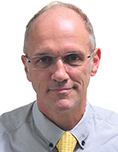A few weeks before the 27th Science Council of the Foundation, we invite you to get to know the members (past and present) of our Science Council. The second member of the Science Council to take part in this exercise is Marco Wopereis, Director-General of the World Vegetable Centre.

1. Why did you become a researcher?
By chance. My dream was to become a veterinarian. However, in the Netherlands, where I come from, that means passing a numerus clausus system, with about 100 places available at Utrecht University for 1,500 candidates. I tried four years in a row, and then gave up. Meanwhile I had to do something else. I started animal science in Wageningen University, but I quickly realized that that was something completely different from becoming a vet. After 6 months I switched to something more down to earth: soil science. I really liked that – a lot of work outdoors. I also did an internship at INRA in Rennes, France and that resulted in a great publication thanks to a very supportive supervisor, Chantal Gascuel. I also improved my French there as it was quite hard to get around with English at the time.
In 1988, I graduated as a soil scientist. However, it was not easy to find a job in that field. I started working as a computer programmer in a huge office building in Utrecht on the 12th floor or so. We drank a lot of coffee there. In the evening I forgot about everything and the next day I picked up the code where I had left it the previous day. Peaceful and perhaps a bit boring. Then one day my professor Johan Bouma calls – he needed someone to take over the coordination of a project on improving water management in rice soils in the Philippines. I was going to work at the International Rice Research Institute, which was then the biggest international research institute in the world. I said yes of course, hung up the phone and then looked on the map to locate the Philippines. I was thrilled! I was going to see a new country, meet new people, and work on an interesting topic related to what I had studied. That was the start of my scientific career.
So I became a researcher by chance. You may have ambitions – like me becoming a vet, but it may not work. In hindsight, maybe if I had become a vet – then I would have spent my life in the Netherlands operating on cats and dogs in a country where it rains cats and dogs all the time... Don’t get stuck in an ambition you have, there are so many opportunities out there that are interesting and fun.
2. What does a "scientific community" mean to you?
A scientific community can mean a rather narrow club of people working in the same thematic field. For example, when I was at AfricaRice, we worked with thematic Task Forces, bringing together national and AfricaRice researchers around a particular topic, e.g. rice diseases, rice breeding, or rice agronomy. But it can also be much broader. At WorldVeg we work more and more within food system settings, looking at constraints in vegetable supply systems, the food environment itself, and barriers to enhanced vegetable consumption. That requires a very broad scientific community. Last but not least, a scientific community should always make use of and build upon indigenous knowledge, e.g. the agronomic knowledge that exists among farmers. I have good memories of the work we did with farmers in West Africa in inland valleys, using a participatory learning and action research approach to enhance rice productivity in these challenging settings. The starting point was always farmer knowledge, and farmers were very much part of our scientific community.
3. What are your ambitions and expectations with regard to the AF SC?
I am excited to become part of a group of very knowledgeable people and to contribute to the important work of the Foundation. The three axes of the Foundation (climate change, biodiversity, and responsible production and consumption) are extremely relevant. The Scientific Council will need to provide guidance and recommendations to the Foundation’s scientific network to ensure that these three axes flourish, interact and connect with other science partners and result in positive outcomes for agriculture and food systems world-wide.